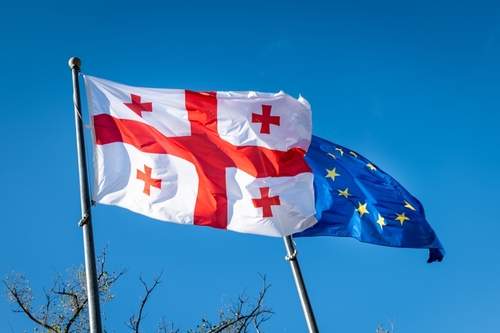Georgia to regulate nursing in landmark law change

Nursing and midwifery will be regulated in Georgia for the first time in the country’s history, the World Health Organization (WHO) has announced.
Georgia’s parliament passed changes to the country’s laws on health and higher education.
“Proposed changes will guarantee every one of us has sufficient competencies”
Irma Kiladze
Among these were the introduction of nursing and midwifery as regulated professions, which the WHO said would bring Georgia’s approach in line with other European countries.
It means that, as of the start of next year, all nurses and midwives in Georgia will be required to join a professional register which will hold them to a set of standards and implement continued professional development provisions.
Irma Kiladze, a primary care nurse based in the small Georgian village of Chakvi, welcomed the upcoming changes: “Ongoing professional education is essential for us to ensure we’re providing the best care for our patients.
“Proposed changes will guarantee every one of us has sufficient competencies and provide a long-awaited recognition for the representatives of this profession.”
Regulation of nursing in Georgia comes amid a significant shortage, relative to population and other healthcare professionals, of nurses and midwives in the country.
Ratios of physicians to nurses in Georgia have varied wildly in recent years; WHO said the ratio was as low as 1:1 in 2022, compared to an average of 2:3 in Europe.
Meanwhile, a lack of training places for nurses has meant there are not enough graduates to meet growing demands for healthcare.
WHO said that it was hoped the law changes would increase the “attractiveness and recognition” of the two professions in Georgia.
The Georgian government’s health department, named the Ministry of Internally Displaced Persons from the Occupied Territories, Labour, Health, and Social Affairs of Georgia (MoIDPLHSA), will now set up an organisation to act as a regulator.
This supervisory body will oversee registration, protect patient’s rights, improve quality of care and decide on penalties for misconduct, according to WHO.
It will exist separately to the existing National Nursing Council, an advisory organisation consisting of nurses, midwives and other healthcare professionals, which has been backing the health ministry’s implementation of regulation for the two professions.
The country’s 23,000 nurses and midwives will be expected to join its new professional register by 1 January 2025.
Tomas Roubal, advisor on health policy at Georgia’s WHO country office, said the law changes represented a “key step” towards improving both healthcare, and the working conditions of nurses and midwives.
“Additionally, educational and professional standards will increase their rightful recognition and remuneration,” said Mr Roubal.
“This legislation will introduce regulatory oversight over these professions and increase patient safety.
“By establishing a register of nurses and midwives, the authorities will be able to adapt education, aligning changing patient needs with necessary professional skills.”






